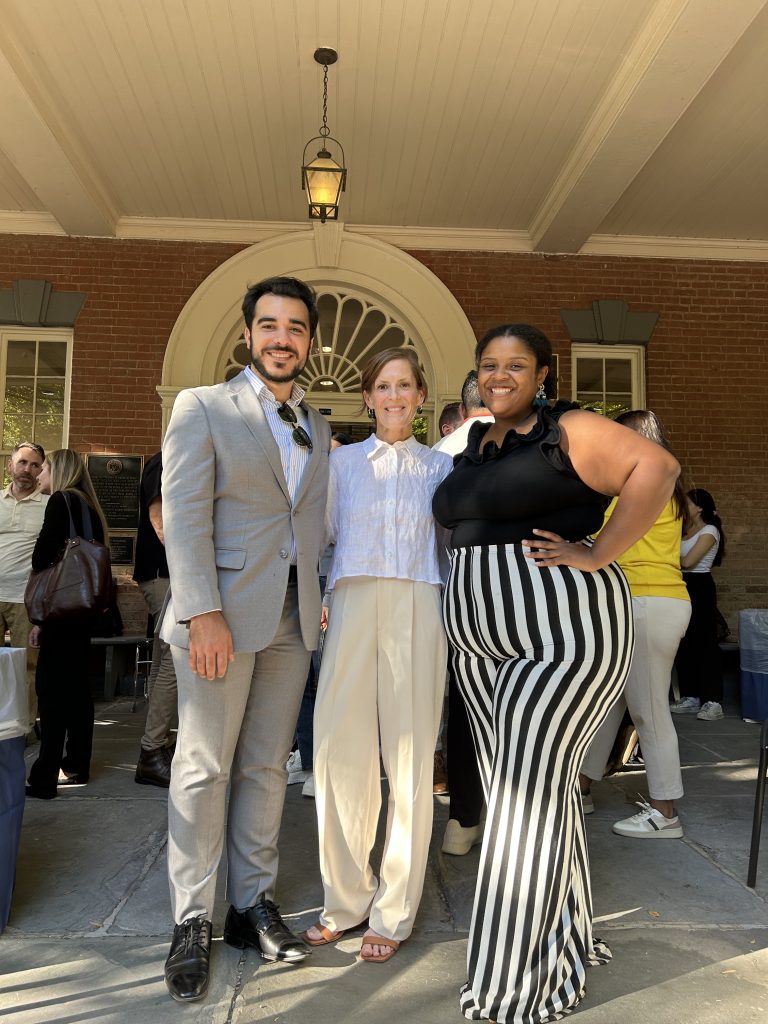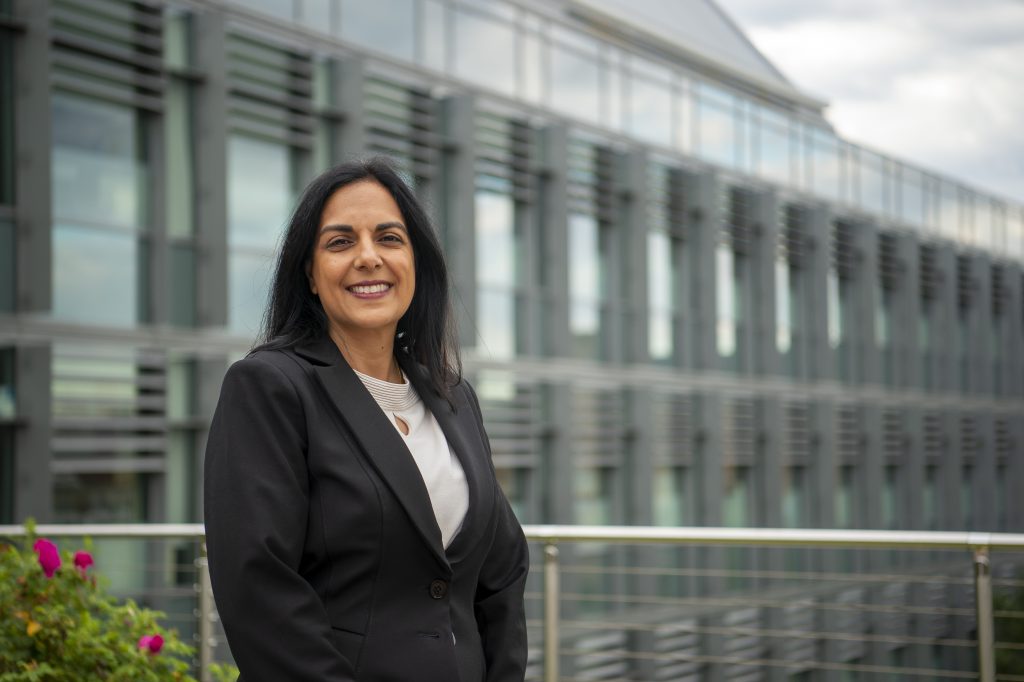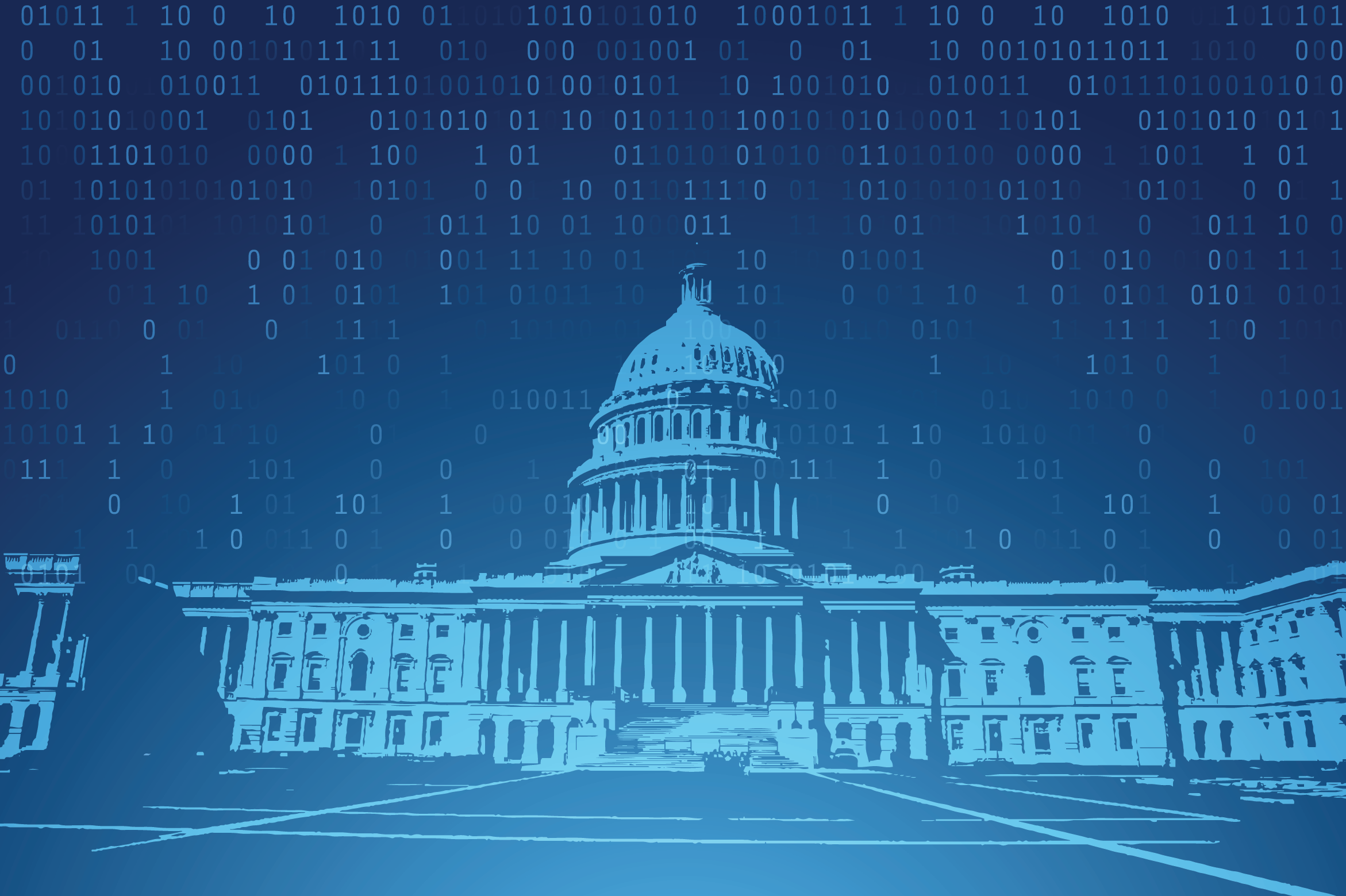Shaping tech for the common good: How Georgetown experts are limiting harms and maximizing benefits
Leading faculty and researchers across Georgetown University’s McCourt School of Public Policy are using powerful computer algorithms and machine learning to improve public policy decision-making. Their work is driving change across diverse sectors, from internet safety and environmental justice to health care and mass migration.
Every day, humans and machines across the globe create 2.5 quintillion bytes of new data, according to IBM — enough to fill 20 billion file cabinets.
Thanks to powerful new computer algorithms and machine learning, the data deluge is being analyzed and mined for information that can be used to impact sectors from internet safety and environmental justice to health care and the future of the internet.
With all of that data mining comes a need for public policy and decision-making to keep pace with the rapid advancement of technology. The McCourt School, with its Massive Data Institute (MDI) and newly formed Tech & Public Policy (TPP) program, is helping to shape and regulate the data revolution.
“It’s no secret we are facing a complex and dynamic set of challenges, both nationally and globally,” said Dean Maria Cancian . “Some challenges, like the rapid pace of technological change, make developing a policy framework that limits the harms while maximizing the benefits even more pressing. That’s why the work of the Massive Data Institute and Tech & Public Policy is so vital.”

Tech & Public Policy Scholars Santiago Vidal Calvo (MPP’25) and Kevyanna Rawls (MPP’24) with TPP Director Michelle De Mooy (middle) at the TPP program welcome reception in October 2023.
TPP Director Michelle De Mooy added that while TPP is a natural extension of McCourt, it mirrors the tech sector itself. “McCourt is doing incredible research around technology and policy, and so I wanted to create a program that directly connects that work to policymakers, but also provides a platform for testing and piloting new tech policy ideas,” said De Mooy. “We’re in a good position to be more innovative and active in this space, to push boundaries a bit, and we’re using some of the approaches that have made the tech sector so successful, such as agility, flexibility, creativity and tackling smaller issues and focusing on the end user.”
To that end, TPP has launched several programs in the last year. The inaugural Ideathon Sprint 2023 brought data science, policy, user experience and marketing graduate students from Georgetown and Sciences Po together to identify tech policy problems and solutions. TPP is piloting a project to partner with a private company to address researcher access to social media data and another project to build focused AI policy solutions.
Predicting mass movements of displaced people
The MDI has conducted a variety of novel data-driven research projects. MDI Director Lisa Singh joined colleagues Katharine Donato (School of Foreign Service) and Ali Arab (College of Arts and Sciences) to partner with the United Nations High Commissioner for Refugees (UNHCR) to blend traditional and new forms of data to better understand and predict mass movements of forcibly displaced populations.
Singh, a professor of computer science, was awarded a 3,000 National Science Foundation grant to host an eight-week Research Experience for Undergraduates (REU) program in the summer of 2023. The effort is targeted to computer science undergraduates interested in data science research with public policy implications.
In its research, MDI relies on data that “are less visible to the human eye or that don’t even necessarily seem logical at first,” said Singh. “Machine learning algorithms can tease out information because they can analyze a large set of data more rapidly. They tend to uncover and identify certain variables or relationships that people may not have been thinking about.”

Lisa Singh
Funding tomorrow’s data scholars
TPP launched the Tech & Public Policy Scholars Program , which in the 2023-24 academic year awarded partial-tuition scholarships of up to ,000. Scholars receive a paid research assistantship to work with Georgetown faculty and affiliated research centers on projects related to technology policy. The interests of these scholars range from predictive policing to biometric data collection.
The TPP annual grants program supports technologists, ethicists, legal scholars and social scientists to collaborate on exploring uses and misuses of technology and how new technologies have outstripped regulatory frameworks designed for the machine age.
“It’s critical that policymakers have up-to-date, high-quality research and information about emerging technologies so that they can make better decisions more quickly,” said De Mooy. “There’s broad agreement now that many of these technologies should be regulated in some way, but less in terms of how to do it. If we want to ensure that democratic values are at the core of regulation, academics, civil society, industry, the public, the government — then all of us have to be actively involved in the conversation.”
Identifying early-onset Alzheimer’s
Carole Gresenz , a health economist and professor at the McCourt School and the School of Health, is working on creating algorithms that use credit bureau data to identify people with early-stage Alzheimer’s disease or other types of dementia. She is exploring how financial decision-making behavior may signal the presence of the disease.

Carole Roan Gresenz
Gresenz is using a massive, anonymized database created in 2022 from Medicare data and credit data, in collaboration with partners from the Federal Reserve Bank of New York and thanks to a grant from the National Institute on Aging. After updating the database, her team will develop algorithms to help identify people at risk for the degenerative diseases.
Gresenz’s team includes Georgetown health economists, a neurologist and a computer scientist. Over the next several years, the team will use data to explore how a range of different financial markers captured in credit data change in the years prior to a dementia diagnosis.
“We want to understand more about the relationship between early-stage dementia and financial behavior,” she explained. “We will explore whether financial information offers the potential for early identification of individuals who are in the initial stages of Alzheimer’s disease and who should be prioritized for clinical screening.”
The work is funded by a .8 million, four-year grant from the National Institute on Aging and builds on Gresenz’s previous research. That research showed that a person in the early stages of Alzheimer’s disease faces a heightened risk of adverse financial outcomes— a likely consequence of compromised decision-making and exploitation and fraud by others.
“Earlier diagnosis yields many benefits for affected individuals and their families — like facilitating planning and ensuring early access to support systems — but wide-scale screening tools are lacking,” said Gresenz. “We want to know if financial red flags years prior to diagnosis might help identify individuals who would benefit from further clinical evaluation, supporting earlier diagnosis and allowing families to take steps to safeguard their financial future.”

Michael Bailey
Making environmental policy more effective and just
In April 2023, Michael Bailey , faculty director of the Master of Science in Data Science for Public Policy (MS-DSPP) program at McCourt, worked with MDI to launch the Environmental Impact Data Collaborative (EIDC). His team is partnering with researchers at Howard University and Morgan State University to use data to make environmental policy more effective and just.
EIDC is working on numerous projects with municipal and federal agencies, startups and nonprofits analyzing data that shows how environmental factors disproportionately impact disadvantaged communities. Massive data can create “predictive models that tend to be more complex than the human mind can wrap itself around, while being able to predict or analyze some important phenomena,” Bailey said.
Bailey and his team are using tax data and building data from BlocPower, a partner focused on building electrification to identify homes that would benefit from federal subsidies to improve energy efficiency. Such funds could help upgrade furnaces and air conditioners in poor neighborhoods.
“Whether it’s the private sector or the public sector, or something in between,” said Bailey, “folks are discovering that a lot of information can lead them to make better decisions and better policies.”
